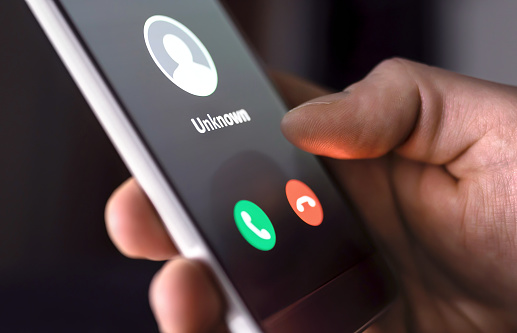Where Do They Get My Number? The Most Common Phone Scams Aimed At The Average Person

Discover what Olivia is talking about from Parenting to Entertainment…
Ever got an important call from the IRS, FBI, or some other important government organization that had no business calling you? Or do you get a lot of annoying robocalls?
These unexpected callers are most likely part of some elaborate scam. Some of these scams have been in operation for years, and bad actors have had many opportunities to refine their routines to separate you from your money.
Phone scammers prey on emotions such as our natural respect for, or fear of authority figures, and they have perfected ways of shaming us for not jumping to help “good causes” or “charity initiatives”.
According to the 2019 U.S. Spam and Scam Report from the company Truecaller, almost 1 in 6 Americans have lost money to a phone scam in 2018.
Where do these creeps get my number?
People-search sites have been proliferating like mushrooms on the internet. A simple internet search will provide you with hundreds of websites where you can get the private information of almost any US citizen.
OneRep is an internet privacy tool developed in 2015 to provide ordinary people with a systematic, thorough way of removing unauthorized or damaging listings of their private information on the internet. Their automated tools continuously remove unwanted listings and monitor the internet to guard against their reappearance.
Since you may already be dealing with the hassle of unsolicited calls and It can be difficult to distinguish between rogue or real, we’ve compiled a list of the most common phone fraud scams that you should guard against.
1. ‘Vishing’ (Voice and Text) phone scams
An authority figure such as a police officer, bank staff member, or someone from the IRS might call you from the blue. They’ll claim that there is something wrong with your account, that you’ve been a victim of fraud, and that they need your personal and financial details to “fix” the issue.
During tax season, scammers often represent themselves as members of the IRS. They may even give you a badge number or employee number and will threaten you with immediate action, imminent arrest, or lawsuits if you don’t make a speedy payment.
This is all fake. The police, bank personnel, or IRS will never contact you to ask for immediate payment or personal information. If the caller instructs you to buy Amazon, Google Play, or other gift vouchers to pay off your debt, this should be an immediate indication that it is not a legitimate call.
2. The Technical Support scam
The scammer will pretend to be someone from a reputable tech company such as Microsoft or Apple. According to these caring people they have just located a dangerous virus on your computer which is in imminent danger of getting locked down.
But never fear! The ‘technical assistant’ will talk you through the fix for this issue.
What they are actually talking you through is how to download software that will hijack your computer or give them complete control over your system. They’ll steal your data, ransack your bank account, or install ransomware that keeps your computer hostage.
Tech companies don’t monitor individual computers. They will never call you to let you know that there is a problem with your computer. When a friendly tech calls you from the blue, just hang up.
Also, read How to Setup a Proxy Server at Home
3. Fake Charity Appeals
After a natural disaster or tragedy, vultures strike to make a profit off someone else’s misery. The scammer will call on behalf of a fake charity, relying on your shock or emotional upset to solicit a donation for their “charity”. Don’t give them any money. If you want to contribute, do your research and donate your money to a real charity.
4. The missed-call phone scam
Some scammers will call you and immediately hang up, hoping that you will call back. Unbeknownst to you, the number that you call may be a premium rate number with massive charges for every second that you are on the line. Don’t call numbers that you don’t recognize, or use a caller ID such as truecaller to expose the true identity of the business or person.
5. Amazon Prime scam
An automated call from Amazon Prime comes in, telling you that your subscription will be ‘renewed’ for $49.99 and to “Press 1” if you want to talk to a representative. You are then connected to a fraudulent account manager who will ask you for bank details and other personal information.
Don’t press 1, don’t talk to the representative, and don’t give them information. As a rule of thumb, if you get a call that sounds like it has been pre-recorded or automated, just hang up.
6. Bailout scam
Scammers love to call elderly people who can’t hear that well to tell them that one of their grandchildren needs their help. The grandchild might be in jail and need bail money, or their car has broken down somewhere at the edge of the world. Because of the urgency of the call, victims often immediately pay the money.
Rather contact the troubled family member or a parent directly. If they are unavailable or allegedly in legal trouble, call the courthouse or police department. Never give someone money over the phone.
7. Bank Fraud scam
When you get a call from a bank alerting you of potential fraud in your account, never give them any personal or financial details. Banks don’t call people to ask for personal details – banks already have all the information they need.
Hang up, and call your bank to confirm if they just called you, but never use any numbers that the scammer gave you. Search the internet for the legitimate number of your bank.
8. Authentication Request scams
“Ask and you shall receive” is a popular scammers motto. They call you pretending to be from a company where you have an account, explain that there is an urgent problem with payment or a difficult order and that they need your password to fix the problem immediately.
This of course is not how companies verify identities, and online passwords should never be provided by phone.
9. Fake Customer scam
Sometimes scammers will target employees of service providers or small businesses who have less stringent refund rules, or who dare not risk reputational damage if the scammer’s claims should happen to be real.
The scammer might pretend to be a customer who is experiencing an emergency that is, in some way, connected to the employee’s job or the business of their employer.
He’ll demand emergency funds to get out of the trouble which the unwitting employee has caused, insisting that you wire the money immediately. They usually threaten legal action and reputational damage if the employee does not comply with their demands.
What should you do if you suspect you have been scammed?
If you aren’t sure that the call is legitimate, hang up the phone and call the official customer service number of the supposed company. Don’t call the number back – do some independent research first.
If you think you have been a victim of a phone scam, file a complaint with the FTC. You can do it online or call 877-382-4357.
What's Your Reaction?
Discover what Olivia is talking about from Parenting to Entertainment & all of the in between. Activities for Kids, DIY, Health & Fitness, Giveaways & More..



